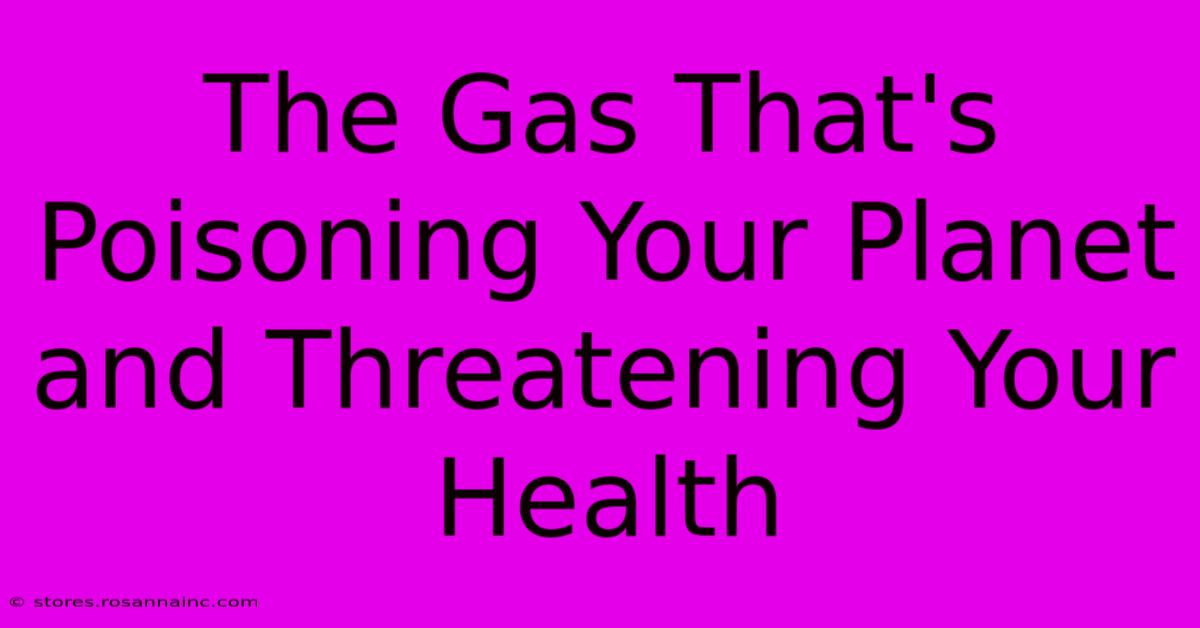The Gas That's Poisoning Your Planet And Threatening Your Health

Table of Contents
The Gas That's Poisoning Your Planet and Threatening Your Health: Methane
The air we breathe is under attack. While carbon dioxide often steals the headlines in the climate change debate, another insidious gas is quietly poisoning our planet and threatening our health: methane. This potent greenhouse gas is far more destructive in the short term than CO2, contributing significantly to global warming and impacting human well-being in numerous ways. Understanding the sources, impacts, and solutions related to methane is crucial for a healthier planet and future.
Methane: A Silent Threat
Methane (CH₄), a colorless, odorless gas, is a powerful greenhouse gas with a global warming potential 84 times greater than carbon dioxide over a 20-year period. While it doesn't linger in the atmosphere as long as CO2, its immediate impact on global warming is far more significant. This means that reducing methane emissions is a critical strategy in mitigating the effects of climate change in the near term.
Sources of Methane Emissions: A Multifaceted Problem
Methane emissions stem from a variety of sources, both natural and human-induced. Understanding these sources is vital to effectively targeting mitigation efforts.
1. Agriculture: This sector is a major contributor, with livestock (cattle, sheep, goats) being a significant source due to enteric fermentation (digestion process). Rice cultivation also releases substantial amounts of methane. Manure management practices play a key role, as improperly managed manure can release large quantities of the gas.
2. Fossil Fuel Production: Leaks and venting during the extraction, processing, and transportation of fossil fuels (natural gas, oil, and coal) contribute significantly to methane emissions. This is a particularly concerning source, given the ongoing reliance on fossil fuels.
3. Waste Management: Landfills are major sources of methane, generated by the anaerobic decomposition of organic waste. Wastewater treatment plants also release methane during the treatment process.
4. Natural Sources: Natural wetlands, termites, and other natural processes release methane, though these sources are generally considered less controllable.
The Impact of Methane on Human Health and the Environment
The consequences of rising methane levels extend far beyond climate change.
1. Climate Change Exacerbation: Methane's potent greenhouse effect contributes directly to global warming, leading to more frequent and intense heatwaves, droughts, floods, and extreme weather events.
2. Air Quality Degradation: High concentrations of methane can displace oxygen in enclosed spaces, leading to asphyxiation. Methane itself is not directly toxic, but its presence often indicates other harmful pollutants.
3. Human Health Impacts: While not directly toxic at low concentrations, high levels of methane can lead to headaches, dizziness, and loss of consciousness through oxygen displacement. Indirectly, the consequences of climate change exacerbated by methane emissions—like heat stress and the spread of infectious diseases—further threaten human health.
4. Environmental Damage: Beyond its role in climate change, methane emissions can contribute to air and water pollution, affecting ecosystems and biodiversity.
Mitigating Methane Emissions: A Collaborative Effort
Addressing the methane challenge requires a multifaceted approach, involving individuals, industries, and governments.
1. Agricultural Practices: Improving livestock management, such as dietary changes and manure management techniques, can significantly reduce methane emissions from agriculture. Exploring alternative rice cultivation methods can also help.
2. Fossil Fuel Management: Investing in leak detection and repair technologies, improving infrastructure, and transitioning to cleaner energy sources are crucial steps in mitigating methane emissions from the fossil fuel sector.
3. Waste Management Innovations: Improving landfill management, including capturing and utilizing methane for energy, and promoting waste reduction and recycling are effective strategies.
4. Policy and Regulation: Stronger regulations and policies are essential to incentivize methane emission reductions across various sectors. Carbon pricing mechanisms and emission trading schemes can play a significant role.
Conclusion:
Methane is a silent killer, slowly poisoning our planet and threatening human health. While addressing this challenge requires a significant collective effort, the urgency of the situation demands immediate and decisive action. By implementing effective mitigation strategies across all sectors, we can lessen the impact of this potent greenhouse gas and pave the way for a healthier planet and future for generations to come. The future of our planet depends on it.

Thank you for visiting our website wich cover about The Gas That's Poisoning Your Planet And Threatening Your Health. We hope the information provided has been useful to you. Feel free to contact us if you have any questions or need further assistance. See you next time and dont miss to bookmark.
Featured Posts
-
Outrageous Deception Top 10 Ads Exposed For Their False Claims
Feb 05, 2025
-
Rise To The Top The Ultimate Guide To Triumphant Fantasy Basketball Team Names
Feb 05, 2025
-
Empower The Worlds Most Vulnerable Children Job Opportunities At Compassion International
Feb 05, 2025
-
Harness The Cosmic Forces Unlocking The Secrets Of Light Blood Hexes
Feb 05, 2025
-
Revealed The Disturbing Links Connecting The Grand Prairie 40 Victims
Feb 05, 2025
